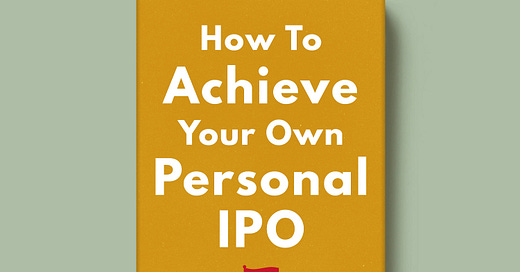How To Achieve Your Own Personal IPO: A Very Different Approach To A Legendary Career
Too many employers value you based on your past, not your potential.
Arrrrr! 🏴☠️ Welcome to a 🔒 subscriber-only edition 🔒 of Category Pirates. Each week, we share radically different ideas to help you design new and different categories. For more: View the mini-book archive | Listen to another category design jam session | Dive into an audiobook | Enroll in the free Category Accelerator email course
Dear Friend, Subscriber, and fellow Category Pirate,
In 1975, the Wall Street Journal ran what is now considered one of the greatest marketing promotions of all time.
It was a sales letter called “The Tale of Two Young Men.” Between 1975 and 2003, this sales letter generated more than $2 billion worth of Wall Street Journal subscriptions. Start to finish, the letter is just under 1,000 words.
It opens with a short tale that goes like this:
“On a beautiful late spring afternoon, twenty-five years ago, two young men graduated from the same college. They were very much alike, these two young men. Both had been better than average students, both were personable and both—as young college graduates are—were filled with ambitious dreams for the future.
Recently, these men returned to their college for their 25th reunion.
They were still very much alike. Both were happily married. Both had three children. And both, it turned out, had gone to work for the same Midwestern manufacturing company after graduation, and were still there.
But there was a difference. One of the men was manager of a small department of that company. The other was its president.”
The letter goes on to explain that the difference between the two young men was that one had access to information the other one didn’t. The young man who went on to become president of the company read TheWall Street Journal. The other, the small department manager, did not.
We love this story. But 1975 was a long time ago, and we would tell it differently today.
We would call it, “The Tale of Two Young Women (And A Pirate).”
On a beautiful late spring afternoon, in the foothills of Silicon Valley, two young women graduated from the same college. They were very much alike, these two young women. Both had been better than average students, both were personable and both—as young college graduates are—were filled with ambitious dreams for the future.
They also had a friend, named Pirate Jane.
Recently, the three of them—the two young women with college degrees, and Pirate Jane—returned to their college for their 25th reunion. Actually, the two young women went to the reunion, and Pirate Jane met up with them afterwards at a bar down the street called Whiskey Waters.
The two young women were very much alike. Both were happily married (at least, that’s what they told the neighbors). Both had three children (although it’s worth noting they called their third kids “surprises”). And both, it turned out, had gone to work for the same technology company after graduation, and were still there.
And there wasn’t much of a difference. Sure, while one was manager of a small department, and the other was president of the company, both had the same number of vacation days. Both had to show up to the office at 8:00 a.m. and were expected to stay until at least 6:00 p.m. And both had a limited amount of agency and freedom over their time, long-term earning potential, and personal autonomy. Aside from the modest gap in their earnings (noticeable, but certainly not astronomical), their lifestyles were nearly identical. They even both drove Teslas.
It should also be noted, both were avid readers of The Wall Street Journal.
“You need to put that paper-pushing, incremental improvement wahooligarchy babble aside,” Pirate Jane yelled, slamming her mug of craft IPA down on the warped walnut bar. “If you’re a candidate, you’re a commodity. Commodities can easily be traded. And if you have any hope of escaping that rat race (never forget the sage words of Lily Tomlin, ‘The trouble with the rat race is, even if you win, you’re still a rat.’), then what you need to work toward is a Personal IPO.”
Welcome to the YOLO Economy.
A few weeks ago, the New York Times published an article about how exhausted type-A millennial workers in America are quitting their jobs in search of more personal freedom.
This is yet another one of the stunning effects the pandemic has had on society. It has led millions of people, all at the same time, to ask themselves, “Why do I do what I do? Why do I live where I live? Am I making a difference? How do I integrate my personal and professional life? Does my work matter?” These are seminal life design questions—to which many are concluding, “Screw it—YOLO” and quitting their jobs altogether in search of meaning.
The New York Times named this phenomenon the “YOLO Economy,” (YOLO being an acronym for “You Only Live Once” originally made popular by Grateful Dead drummer, Mickey Hart, and more recently, Hip-hop phenom, Drake.) In the piece, NYT interviews characters like Brett Williams, 33, a lawyer in Orlando, Florida, who has come to the “YOLO epiphany” that spending ten hours a day on Zoom calls at his kitchen island in the name of a paycheck was, to put it lightly, miserable. Instead, he and many others are trading in their salaries and benefits for gig-economy jobs, choosing autonomy and personal agency over job security, corporate credibility, and retirement plans—all things we’re told to strive for early in our lives (and whom many take out five or six figures worth of college debt to pursue).
The NYT article goes on to share some startling statistics about how prevalent this mentality is in today’s working America.
According to a study by Microsoft, more than 40 percent of the global workforce is considering leaving their employer this year. And according to Blind, an anonymous social network popular among tech workers, 49 percent of its users are planning to land a new position in 2021. A good job, nice car, steady paycheck, and white picket fence are no longer enough.
In the words of Loverboy, many are done “Working for the Weekend.”
Instead, what people want is agency, choice, freedom and meaning. What people want is to be the captain of their own soul, the author of their own destiny.
What people want is to be Pirates.
Your Personal IPO
This desire for personal autonomy has been around for a long time. It’s a foundational human drive.
Even before the pandemic, we were writing about how high performers were quitting big companies to work for themselves. The reason is that, eventually, you realize that regardless of how high you climb up the corporate ladder, your future is at the mercy of someone else.
We call this journey working toward your “Personal IPO”: A strategy for finding deeply meaningful work and living a happy, successful, and highly profitable life.
The same way a startup strives to one day achieve a liquidity event, we believe every ambitious worker strives for (and/or eventually realizes the power of) a personal freedom event—whether that means quitting your job and going solo, or hopping aboard someone else’s ship who values your future with a higher multiple. This is the day when you become responsible for your own livelihood, and unlock a world of opportunity, agency, and earning potential that is otherwise impossible taking incremental steps forward in the conventional working world. The question is how to obtain personal agency without driving Uber or delivering Postmates 60 hours a week in order to keep paying the bills.
To be clear, what we are talking about is not a “4-Hour Workweek” for travel-obsessed Millennials, or a Eat, Pray, Love moment for anyone successful but unfulfilled and in need of a retreat to Italy, India, and Indonesia before turning back to the corporate world with a newfound zest for life.
The fact of the matter is many women and men of every race, religion, and socioeconomic background spend their entire lives thinking they’re on the right path, the “elite” path—Wharton MBA, high-paying job at McKinsey—only to realize five, ten, twenty plus years later, “Wait a minute, I’m still an employee. Someone else cuts my check. And while I might be a ‘Successful Professional,’ all of a sudden that doesn’t seem as good as the lower-rung Pirate who has freedom over their life.” (We know ski bums who “scrape by” but have more joy and agency than some of the CEOs we know.)
Hence today’s YOLO Economy.
The Personal IPO Formula
In order to successfully take control of your life and career, while achieving agency, you don’t need A’s in school—especially in today’s digital-first world. (Pirate Christopher didn’t even go to school! And Pirate Cole failed math and science but got a degree in fiction writing!)
What you need are answers to these three questions:







